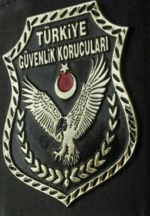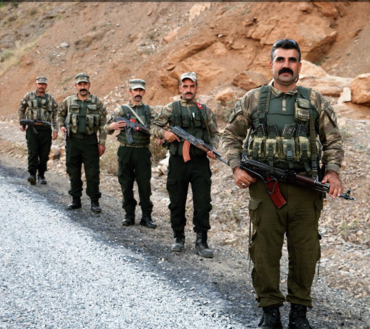Village guard system
Village guards (Turkish: Korucular), officially known as Türkiye Güvenlik Köy Korucuları ("Security Village Guards of Turkey") are Gendarmerie General Command-aligned paramilitaries involved in the Kurdish-Turkish conflict, recruited mostly from ethnic Kurds in Turkey[2] but also from ethnic Circassians,[3] Turks,[4] Uzbeks[5] and Kyrgyz people.[6] Originally they were set up and funded by the Turkish state in the mid-1980s under the direction of Turgut Özal. Their stated purpose was to act as a local militia in towns and villages, protecting against attacks and reprisals from the insurgents of the Kurdistan Workers Party (PKK). The rationale behind the establishment of the village guards was that it would be helpful to the Turkish Army to have an additional force of people who knew Turkish Kurdistan and the language in order to assist in military operations against the PKK.[7] The force consists of approximately 90,000 village guards in total. Many have been forced to join, with refusals meeting with sexual assault, property destruction, and exile. They have been implicated in a range of human rights abuses, including extrajudicial execution and torture, as well as drug smuggling and extortion.
| Village guards | |
|---|---|
Türkiye Güvenlik Korucuları Participant in Kurdish–Turkish conflict (1978–present) | |
 Logo | |
| Active | 26 March 1985—present |
| Leaders | Süleyman Soylu (Minister of the Interior) |
| Headquarters | Ankara |
| Area of operations | Turkish border areas |
| Size | 90,000 (2019)[1] |
| Part of | Gendarmerie General Command |
| Opponent(s) |
|
| Battles and war(s) | |
| Website | https://www.icisleri.gov.tr/illeridaresi/korucular-daire-baskanligi |
Background
The Village Guards were levied according to an amendment to the "Law of Temporary Village Guards" of 1924, which was introduced due to the lack of security officers after the war of independence. The amendment was approved by the Turkish parliament in March 1985, after the first major confrontations between the PKK and Turkey.[8] There are separate classifications of paid and voluntary village guards, with both being allowed the bear weapons. In 1985 there were 3,679 weapons given to 7,933 village guards.[9] From 1985 to 1990, recruitment of village guards was mainly accomplished by negotiating with tribal chieftain, with the tribes being awarded greater autonomy rights in exchange for their services.[9]
History
The establishment of the Village Guards resulted into a change of policy by the PKK, who reorganized its military wing at the 3rd party congress in October 1986 and made the joining of its military wing the Kurdistan People's Liberation Force compulsory.[10] The village guards are frequently targeted by PKK militants as they are seen as "traitors". During the ongoing conflict since 2015, 62 village guards have been killed.[11] The village guards received an attractive salary. At times they received a monthly pay of around $230 US Dollars while at the same time the annual salary was $400.[12] The Village Guards gained wealth through smuggling over the Turkish-Iraqi border for which they had immunity. It was even stated by Van Bruinessen that some village guards were recruited among known smugglers.[9] The amount of village guards surged from 18,000 to 63,000 between 1990 and 1994.[13]
In 2012 the Turkish Government indicated that it was planning to phase out the village guard system.[14] But as the conflicts started again in 2014, the village guards assumed the local guiding and local protection operations. This time, the state not only accepts volunteers. Now, in order to deal with the unemployment in the region, the government hires young people who just finished military service as commando, to become a village guard. Except for women volunteers, it became difficult to be a village guard since 2014, too many applications were made in the last years. The Gendarmerie General Command brought new conditions to become a village guard after announcing 25,000 people will be employed as village guards in 2019.[15]
Accepting to become a village guard is a largely voluntary process, although there are exceptions.[16] In a report by the Human Rights Watch, it is mentioned that if the villagers did not want to become village guards, it was likely that their settlement was surrounded by troops loyal to the Turkish Government and then the village would be destroyed and evacuated.[17]

Human rights
Autonomy came also with an immunity for crimes even for rapes or killings. The right to bear army often lead to solving disputes between a village guard and a "terrorist" in the killing of the latter. At times also minor conflicts during the soccer game of children or in business relations were solved this way.[9]
Whilst by not officially endorsed by the Turkish Government, some village guards are reported to have been involved in "disappearances", extrajudicial executions[18] and torture.[16] The Turkish government reported that the Village Guards were implicated in attacks on Kurdish internally displaced persons returning to their villages after forced evacuation.[19]
During the conflict Turkish government used village guard system to distinguish “loyal” and “disloyal” citizens and backed the system with material benefits and coercion.[20]
A report by the Turkish Parliament in 1995 confirmed that village guards have been involved in not just these but a wide range of illegal activities, including killing, extortion, and drug smuggling.[18] Human Rights Watch has stated that for years they have received reports of "violations by village guards—murders, rapes, robberies, house destruction, and illegal property occupation, among others". They add however that not all of these reports have been confirmed first hand.[21]
People who refused to join the village guards have had their homes burned,[22] or have been forced to leave and their homes and property seized. They have endured sexual assault and humiliation by the Turkish security forces.[23] There have been some attempts by the Turkish authorities to compensate people who have lost property in this way. A member of the Turkish Parliament, Ünal Erkan and former governor of some areas of south-eastern Turkey states that, "village guards often operated outside the control of the gendarmerie, and that many villagers faced pressure to enter the system".[23]
The Turkish Interior Ministry estimated that 296 murders were committed by village guards between 1985 and 1996.[24] In a subsequent report in 2006, the Ministry indicated that some 5,000 village guards were involved in criminal activities. [25] The journalist Gottfried Stein relates former lieutenant in the Turkish Army Yener Soylu as describing the process of persuading some villagers to join the village guards:[26]
"We posed the people with a choice, either they acted as village guards, or they would be resettled in other provinces. In the evening, we staged what appeared to be a skirmish with the guerrillas, we shot at windows and also directed heavy weapons against the village. As the people depended on their harvest and animals, we destroyed their fields and slaughtered the animals. If this did not help, we surrounded the village and sent in the counter-guerrillas."
The Village Guards have been implicated in attacks on Kurdish internally displaced persons returning to their villages after forced evacuation.[27]
See also
References
- "Türkiye'de kaç tane köy korucusu var? Köy korucularının görevleri nelerdir?".
- "Kurds who became 'village guards' and fought PKK rebels in Turkey to". 16 February 2014. Retrieved 30 July 2016.
- AKP settles Kyrgyz 'migrants' in Northern Kurdistan
- Giresun'da 750 köy korucusu göreve başladı
- Korucu aşiretleri: Biz ne olacağız?
- ARMING CIVILIANS FOR COUNTER-TERRORISM: TURKEY’S VILLAGE GUARD SYSTEM
- UNHCR/ACCORD: 6th European Country of Origin Information Seminar Vienna, 13 – 14 November 2000 – Final report
- The Routledge Handbook of Turkish Politics. Routledge. 2019. p. 276. ISBN 9781138500556.
- The Routledge Handbook of Turkish Politics. Routledge. 2019. p. 277. ISBN 9781138500556.
- Gunes, Cengiz (11 January 2013). The Kurdish National Movement in Turkey: From Protest to Resistance. Routledge. pp. 104–105. ISBN 978-1-136-58798-6.
- Turkey's PKK Conflict: The Rising Toll
- Romano, David (2006). The Kurdish National Movement. Cambridge: Cambridge University Press. p. 83. ISBN 9780511616440.
- The Routledge Handbook of Turkish Politics. Routledge. 2019. p. 278. ISBN 9781138500556.
- "Opposition ambivalent as gov't rallies to solve Kurdish issue". Today's Zaman. 2 August 2009. Retrieved 24 August 2009.
- "25 bin korucu ne zaman alınacak? 2019 25 bin korucu alımı son dakika başvuru şartları koşulları nedir?". takvim.com.tr (in Turkish). Retrieved 5 November 2019.
- "Turkey". U.S. Department of State. Retrieved 6 April 2016.
- "Unjust, Restrictive, and Inconsistent: The Impact of Turkey's Compensation Law with Respect to Internally Displaced People: Background". www.hrw.org. Retrieved 6 July 2020.
- "Turkey and War in Iraq: Avoiding Past Patterns of Violation (Human Rights Watch Briefing Paper, March 2003)". Retrieved 6 April 2016.
- "Turkey: "Still critical": Summary". Retrieved 6 April 2016.
- "Page Not Found" (PDF). Retrieved 6 April 2016.
- "Turkey: Letter to Minister Aksu calling for the abolition of the village guards". Human Rights Watch. Retrieved 6 April 2016.
- Amnesty International – 1996 – Turkey Campaign Archived 14 July 2007 at the Wayback Machine
- Council of Europe – Report – Humanitarian situation of the Kurdish refugees and displaced persons in South-East Turkey and North Iraq Archived 25 April 2005 at the Wayback Machine
- "Helsinki". Retrieved 6 April 2016.
- "Opposition ambivalent as gov't rallies to solve Kurdish issue". Today's Zaman. 2 August 2009. Retrieved 24 August 2009.
- Stein, Gottfried. (1994) Endkampf um Kurdistan? Die PKK, die Türkei und Deutschland (The final battle for Kurdistan? The PKK, Turkey and Germany). (Bonn) ISBN 3-87959-510-0
- "Turkey: "Still critical": Summary". Retrieved 6 April 2016.